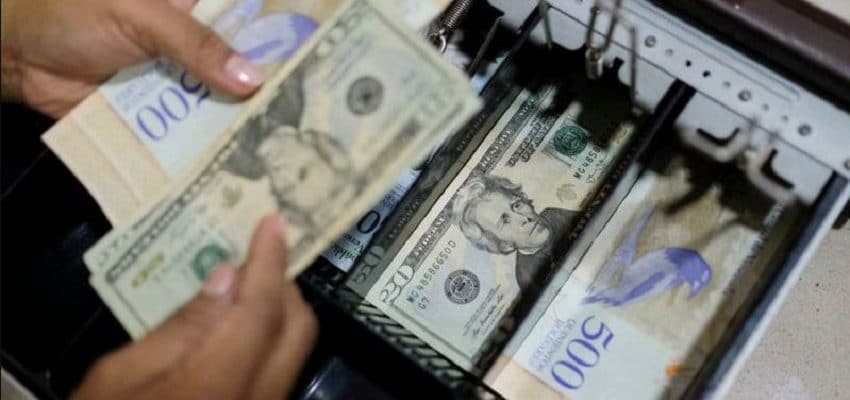
Cash register in Venezuela containing US dollars and Venezuelan bolivars. File photo courtesy of Banca y Negocios.

Orinoco Tribune – News and opinion pieces about Venezuela and beyond
From Venezuela and made by Venezuelan Chavistas

Cash register in Venezuela containing US dollars and Venezuelan bolivars. File photo courtesy of Banca y Negocios.
Caracas, November 7, 2021 (OrinocoTribune.com)—For the second consecutive month, inflation in Venezuela slowed down and closed at 6.8% for the month of October, compared to that in September, which stood at 7.1%, the Central Bank of Venezuela (BCV) reported on its website.
This is the lowest inflation figure so far this year, according to information released by Venezuela’s highest financial institution. The data reported for October inflation is the eighth in a row below 50%, the longest streak since hyperinflation began, and is a key indicator to measure the end of the hyperinflation crisis. Most economists agree that if inflation is below 50% for 12 months in a row, it may be said that the hyperinflation crisis has ended.
RELATED CONTENT: President Maduro Orders Action Against Disruptors of National Economy
Venezuela might reach that goal by the end of December this year, but many analysts worry about the pressure that the monetary mass would imply for inflation numbers for November and December, months when traditional end of year bonuses are paid to workers. Many analysts also expect an official adjustment in wages before the end of the year.
According to the BCV, accumulated inflation in the last 10 months is 574.4%. The data published by the BCV puts the inflation rate in August at 19.8%, in July 16.7%, and in June at 15.5%.
The International Monetary Fund (IMF) projected that in 2021 the Venezuelan economy will contract by 5%, but many experts believe that 2021 might be the last year of GDP decline in Venezuela since 2013, when the country registered a GDP growth for the last time.
RELATED CONTENT: Central Bank of Venezuela Injects $50 Million into Foreign Exchange Market
According to data from BCV, the rise in prices in October was mainly in the following areas: communications (23.4%), leisure and culture (11.99%) and education (14.53%). BCV figures indicate a significant slowdown of price rise in several other items, however, two of them registered increases above what they showed in 2020.
The items showing an overall increase in prices are Education and Household Services (other than phone service). According to experts, this might be the result of the reactivation of in-person classes in Venezuela in October, after over 18 months of remote classes due to the pandemic and tight biosecurity measures taken by Maduro’s administration. The second item reflects increase in the price of utilities such as water and electricity that were not expected by Venezuelans and have created discomfort among many Venezuelans.
Featured image: Cash register in Venezuela containing US dollars and Venezuelan bolivars. File photo from Banca y Negocios.
Special for Orinoco Tribune by Jesús Rodríguez Espinoza
OT/JRE/SC

Jesús Rodríguez-Espinoza is an expert in international relations, Venezuelan politics, and communication. He served for several years as Consul General of Venezuela in Chicago (United States); before that, he was part of the foundational editorial team of Aporrea.org. He is the founder and editor of the Venezuelan anti-imperialist news outlet Orinoco Tribune.